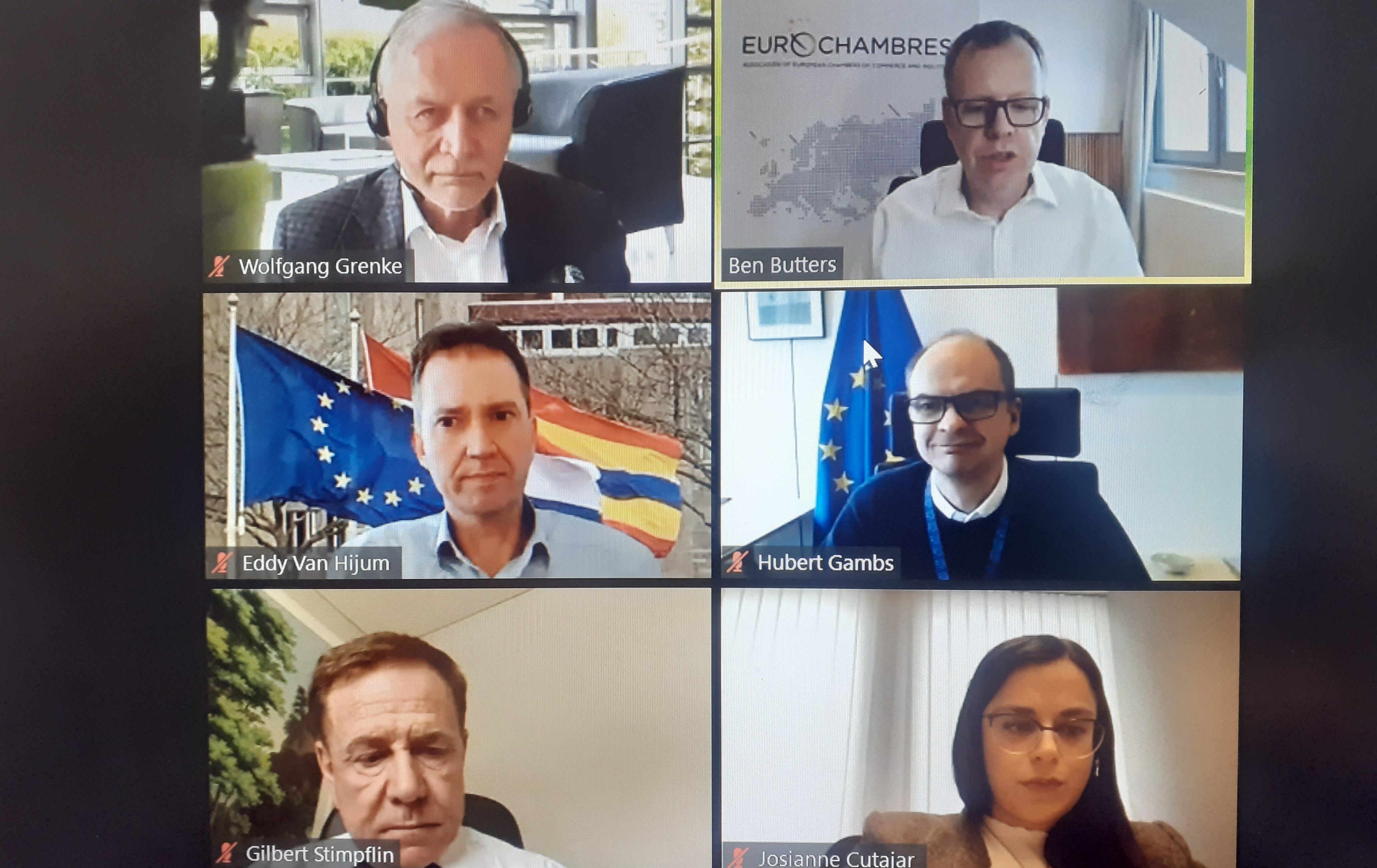The EU SME Strategy one year on: Challenges and Opportunities

The EU SME Strategy, published exactly one year ago by the European Commission aimed at helping small businesses leading the twin transition, reducing regulatory burdens and red tape, supporting market access and entrepreneurship, and improving access to financing. However, the COVID-19 pandemic is threatening the viability of European SMEs due to serious disruptions of global supply chains, transport and travel restrictions, and the collapse in consumption and consumer confidence.
The EU SME Strategy one year on: Challenges and Opportunities” online event that EUROCHAMBRES co-organised with the Committee of the Regions on 10 March 2021 took stock of the Strategy’s achievements in the preceding 12 months, amid the crisis and recovery process.
Following the introduction by Gilbert Stimplin, Co-Chair of EUROCHAMBRES’ SMEs and Economic Policy Committee, a panel composed byHubert Gambs, Deputy Director-General of DG GROW, Josianne Cutajar, MEP and shadow rapporteur of the European Parliament’s report on the SME Strategy, Eddy van Hijum, rapporteur for the Committee of the Regions’ opinion on the SME Strategy, and Wolfgang Grenke, EUROCHAMBRES Vice President and Co-Chair of the SMEs and Economic Policy Committee, exchanged views about state of play of the Strategy and how to ensure access to support measures. The discussion was followed by closing remarks from the Chair of the Commission for Economic Policy of the Committee of the Regions, Michael Murphy.
Mr. Stimpflin highlighted that European SMEs have been hit the hardest by the crisis, facing logistical issues, productivity constraints and demand decline due to lockdown measures, plus a drop in consumer confidence. He reminded that businesses need room to recover and that EU policy interventions need to be sensitive to SMEs, rather than adopting a one-size-fits-all approach.
Building up on this, Mr Gambs underlined the role that the European Commission has had in rapidly channelling financial support towards SMEs to strengthen their short-term resistance to the crisis and reinforce their long-term competitiveness, growth, and employment creation potential. The Commission believes that employment-enhancing measures together with upward convergence strengthened by the Recovery and Resilience Facility will give the SME Strategy new impetus through investments in environment, and digital initiatives.
MEP Cutajar focused on the Parliament’s actions towards monitoring and raising visibility to the SME Strategy in the broader context of Europe’s economic recovery. SMEs have faced hardship and still face uncertainty. The strategy that was published a year ago became outdated overnight and should be adapted to the new reality. She regretted that, 18 months into the von der Leyen Commission, the EU SME Envoy had not yet been appointed, a role that without doubt could enhance the focus on a systematic and consistent implementation of the “think small first” principle and integrate the Strategy’s coherence and future-oriented approach.
Mr van Hijum stressed that local and regional authorities are best positioned to develop and coordinate placed-based policies for SMEs, in close partnership with regional stakeholders and actors of the quadruple helix in their territories. European and national strategies should embrace ‘think small, act regional’ as a guiding principle: build capacity at regional level, link strategic priorities with available funding and match them with SMEs’ needs on the ground.
Vice President Grenke also reminded the participants of the importance of a prompt appointment of a high-ranking SME Envoy to ensure the think-small-first principle is applied throughout all EU legislation and across all Directorates of the Commission. Furthermore, he pointed out that the EU needs to guarantee the integrity of the Single Market by removing remaining unjustified barriers, avoiding the creation of new ones, better implementing, and enforcing existing legislation, and stimulating investment in SMEs through the modernisation of state aid rules.
Mr. Murphy concluded saying that SMEs have always been the backbone of the EU economy and are now in the eye of the storm. It is vital that all SMEs get the financial support that they so badly need in order to be the motors of the recovery. He called for a genuine partnership among the European, national, regional, and local authorities and policy makers on a smooth delivery of the EU recovery plan, to the benefit of SMEs and local communities.
Discussions during the event, attended by more than 200 participants, allowed participants to delve on the vital role that Chambers of Commerce and Industry and EU regions will play in the recovery process. Chambers believe that a co-ordinated policy response at the European, national, and regional levels will need to shift from its initial focus on the survival of small businesses in the short term, towards a medium and longer-term approach driven by sustainability, enabled by technology, and based on upward innovation, internationalisation, and economic growth. Chambers are committed to working together with EU institutions towards helping SMEs in achieving these goals.

